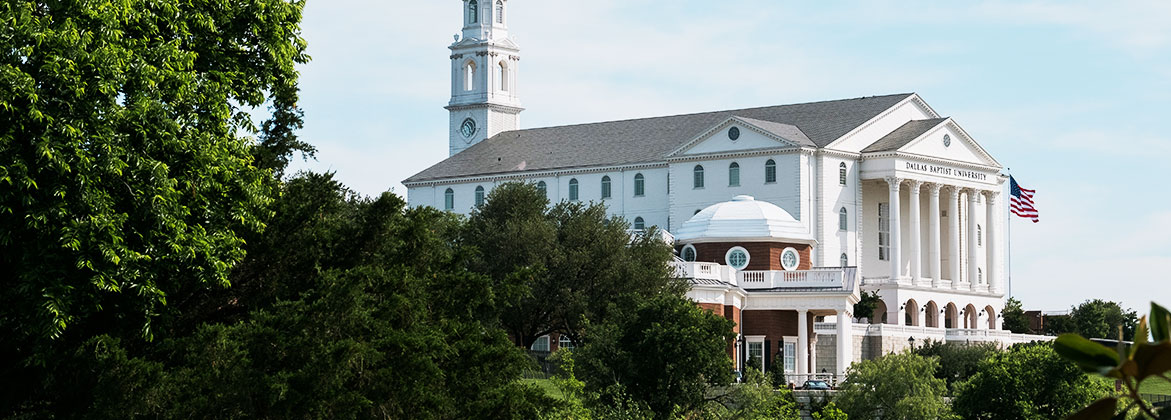Master of Arts in Psychology
The MA in Psychology at Dallas Baptist University is a master’s program for those who desire to help people. Do you have a heart for individuals who struggle with mental health issues? Our master’s degree in psychology can empower you to become an advocate and make an impact on the lives of those in need.
More than an Education
DBU offers the premier Christ-centered MA in Psychology, a 60-hour program designed to prepare graduates as a Licensed Psychological Associate (LPA). The LPA allows graduates to practice as a mental health practitioner in the state of Texas. For those who desire even more career flexibility, with only two extra courses, students may choose to prepare to become a Licensed Specialist in School Psychology (LSSP). Our small class sizes (16:1 student to faculty ratio) provide an environment where professors invest individually in a mentoring relationship that facilitates learning. Because you are more than just your career, we are committed to excellence in academics and exceptional investment in your personal development.
Marked by Service
At DBU we are dedicated to your success. We believe that how you achieve is more important than what you achieve. This is why we’re passionate about our mission to produce Christ-centered servant leaders who with every lecture, assignment, project, and engagement, are being equipped to impact the world through their respective calling. An investment in a DBU MA in Psychology is an investment that can yield an eternal reward and can equip you for your calling to help others.
Meet the M.A. in Psychology Program Director
"My full-time job is to take care of you. Whether providing clarity, advising for classes, enrolling, or any need that is specifically yours, I have been called to be of service."- Dr. Parnell Ryan, Program Director
(214) 333-5694 | parnell@dbu.edu

Program Details
With many career paths available, our M.A. in Psychology program provides several options to customize your master's degree with dual degrees and advanced certificates for a rewarding career.
College of Humanities and Social Sciences
Additional M.A. in Psychology Program Information
View DBU Graduate School’s admission requirements.
Admission to one graduate program does not guarantee admission to another. Applicants who show potential for graduate study but do not meet the criteria for Full Admission may be admitted for up to 12 hours under provisional status. Students admitted under Provisional Admission will be granted Full Admission upon successful completion of 12 credit hours and fulfillment of the conditions of their admission as determined by the Master’s Degrees Admission Committee.
Full Admission Requirements | International Admissions | Transfer Admissions
Dr. Parnell Ryan is a well-known and well-respected Licensed Psychologist and Counselor in the DFW area. He began his education at University of New Mexico and earned both his master’s and doctoral degrees from Southwestern Baptist Theological Seminary.
Dr. Ryan has served the metroplex through counseling and providing diagnostic testing to individuals, couples, children, and families. His passion for teaching the next generation has led him to teach psychology courses at Southwestern Baptist Theological Seminary, Criswell College, Tarrant County College, Weatherford College, Weatherford ISD, and Dallas Baptist University.
Dr. Ryan understands the importance of mentorship in the classroom. He is recipient of the DBU Patriot Mentor Award and Tarrant County College Outstanding Adjunct Faculty Award. Dr. Ryan and his wife are members of First Baptist Church Arlington and are parents to two daughters.
Dr. Harry Beverly is currently serving as the Psychology Department Chair and Assistant Professor of Psychology and Counseling at Dallas Baptist University. He has been a Licensed Professional Counselor since 1990 and is a member of the American Association of Christian Counselors.
He is a graduate of Southwestern Baptist Theological Seminary with both his graduate and doctoral degrees. Dr. Beverly has served across a wide array of psychological occupations and leadership positions. During his career he has worked as an inpatient psychotherapist, a director of an eating disorder clinic, served First Baptist Church McKinney as a Minister of Family Life, and continues to mentor and teach students in higher education.
Preparation for Licensure
A Degree for Eternal Impact
A Master of Psychology at DBU will prepare you for your calling as a servant leader in a wide array of psychological occupations. The MAP positions students to practice in both Christian and secular areas of psychology. Collaborate with peers and learn from experienced professors on advanced counseling techniques and psychological testing methods.
A Licensed Psychological Associate has a unique opportunity to practice independently in Texas, and this program is providing cutting-edge opportunities for those seeking LPA Licensure. For six more hours, students can also become a Licensed Specialist in School Psychology. After 60-66 hours of hands-on learning, graduates will be prepared to take the EPPP or Praxis exams depending on their chosen career path.
At DBU, your calling is our mission. Our faculty members want to help you discern your next steps towards furthering your education, gaining licensure, and developing your eternal impact in the world as ambassadors for Christ.
Frequently Asked Questions
1. How does one become a Licensed Psychological Associate in Texas?
A Licensed Psychological Associate (LPA) is achieved after earning a master's degree in Psychology and passing the Examination for Professional Practice in Psychology (EPPP); however, other requirements may be needed for obtaining licensure through another state. This will be discussed with the MAP Director prior to beginning the program, as practice limitations vary from state to state.
2. What is the difference between an LPA and LPC?
While there are many similarities between an LPA and a Licensed Professional Counselor (LPC), an LPA’s graduate coursework provides a broader knowledge of applied psychology allowing vocational opportunities in assessment, intervention, and application for diverse areas such as business and industry, forensic, sports, medical, research, and technology. Both the LPA and LPC can practice independently when meeting certain requirements.
3. How is the LSSP degree plan different from the LPA degree plan?
While the degree program is similar, there are a few differences. Those on track to receive their LSSP must take an additional 6 hours of Special Education courses, which can be found in the degree plan. The internship for those pursuing the LSSP must be in the education system. Your graduate advisor and program director can help guide you on beneficial options for an internship; however, securing that internship is the student's responsibility. The licensure for an LSSP is dependent on the passage of the Praxis School Psychology Examination and the passage of the Jurisprudence Examination.
4. Do you have a standardized entrance test requirement?
Entrance exams are optional. For those who opt for submitting an entrance exam, the Miller Analogies Test (MAT) or the Graduate Record Examinations (GRE) will be accepted. Selected applicants may be asked to submit an entrance exam score prior to program acceptance, depending on previous academic performance.
5. How long is the program?
The program is 60 credit hours. If a student is pursuing the LSSP licensure, the program is 66 hours due to the additional 6 credit hours listed in the degree plan.
6. What kind of internships are available?
Internships for students enrolled in the Master of Arts in Psychology may be available in business and industry, forensic, sports, medical, research, therapeutic, education, and technology settings. The student is responsible for finding their own internship, with guidance from the MAP Director.
7. What time are classes in session?
Most classes will be held in the evening at 5:15 p.m. and 7:45 p.m. Some classes may be offered during the day. Depending on the course, there may be online options available.
8. What are the prerequisites?
There is one undergraduate-level psychology prerequisite: General Psychology, or other similar courses.
9. Can I transfer in credits?
Yes. Please contact the MAP Director to determine if classes may transfer.
10. How long will it take to get an admissions decision?
You should receive an admissions decision within one to two weeks, upon completion of the entire application process.
Why Study Psychology in Graduate School?
- To understand people better
- To develop a diverse set of skills
- To make a positive difference
- To enter a growing field
- To choose from multiple disciples and specialties
- To prepare for a Master of Arts in Psychology
- To fulfill your calling
Read more about Why You Should Get a Psychology Degree.
What are the Career Paths Available for a Psychology Degree?
- Christian-based mental health counselor or therapist
- Social worker
- Teacher
- Career counselor
- Forensic psychologist
- Probation officer
- Advertising/marketing manager
- Sales representative or account executive
- Market research analyst
- I/O psychologist
Read more about possible Psychology Degree Career Paths.


